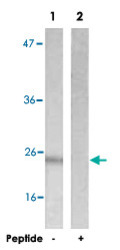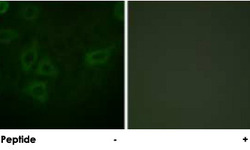Antibody data
- Antibody Data
- Antigen structure
- References [4]
- Comments [0]
- Validations
- Western blot [1]
- Immunocytochemistry [1]
- Immunohistochemistry [1]
Submit
Validation data
Reference
Comment
Report error
- Product number
- PAB18228 - Provider product page

- Provider
- Abnova Corporation
- Proper citation
- Abnova Corporation Cat#PAB18228, RRID:AB_10717144
- Product name
- TK1 polyclonal antibody
- Antibody type
- Polyclonal
- Description
- Rabbit polyclonal antibody raised against synthetic peptide of TK1.
- Storage
- Store at -20°C.Aliquot to avoid repeated freezing and thawing.
Submitted references [Effects of renal carcinoma cell line ACHN-derived exosomes on ACHN cell proliferation and apoptosis].
The potential immunogenicity of the TK suicide gene does not prevent full clinical benefit associated with the use of TK-transduced donor lymphocytes in HSCT for hematologic malignancies.
An HSV-TK transgenic mouse model to evaluate elimination of fibroblasts for fibrosis therapy.
Evaluation of HSV-tk gene therapy in a rat model of chemically induced hepatocellular carcinoma by intratumoral and intrahepatic artery routes.
Yang L, Wu X, Luo C, He Y, Zhang Y, Chen X, Zhang L, Chen L
Nan fang yi ke da xue xue bao = Journal of Southern Medical University 2012 Oct;32(10):1498-502
Nan fang yi ke da xue xue bao = Journal of Southern Medical University 2012 Oct;32(10):1498-502
The potential immunogenicity of the TK suicide gene does not prevent full clinical benefit associated with the use of TK-transduced donor lymphocytes in HSCT for hematologic malignancies.
Traversari C, Marktel S, Magnani Z, Mangia P, Russo V, Ciceri F, Bonini C, Bordignon C
Blood 2007 Jun 1;109(11):4708-15
Blood 2007 Jun 1;109(11):4708-15
An HSV-TK transgenic mouse model to evaluate elimination of fibroblasts for fibrosis therapy.
Tian B, Han L, Kleidon J, Henke C
The American journal of pathology 2003 Aug;163(2):789-801
The American journal of pathology 2003 Aug;163(2):789-801
Evaluation of HSV-tk gene therapy in a rat model of chemically induced hepatocellular carcinoma by intratumoral and intrahepatic artery routes.
Gerolami R, Cardoso J, Lewin M, Bralet MP, Sa Cunha A, Clément O, Bréchot C, Tran PL
Cancer research 2000 Feb 15;60(4):993-1001
Cancer research 2000 Feb 15;60(4):993-1001
No comments: Submit comment
Supportive validation
- Submitted by
- Abnova Corporation (provider)
- Main image

- Experimental details
- Western blot analysis of extracts from COLO 205 cells, using TK1 polyclonal antibody (Cat # PAB18228).Peptide "+" means "peptide blocking".
Supportive validation
- Submitted by
- Abnova Corporation (provider)
- Main image

- Experimental details
- Immunofluorescence analysis of HepG2 cells, using TK1 polyclonal antibody (Cat # PAB18228).Peptide "+" means "peptide blocking".
- Validation comment
- Immunofluorescence
Supportive validation
- Submitted by
- Abnova Corporation (provider)
- Main image

- Experimental details
- Immunohistochemical analysis of paraffin-embedded human breast carcinoma tissue using TK1 polyclonal antibody (Cat # PAB18228).Peptide "+" means "peptide blocking".
- Validation comment
- Immunohistochemistry (Formalin/PFA-fixed paraffin-embedded sections)
 Explore
Explore Validate
Validate Learn
Learn Western blot
Western blot